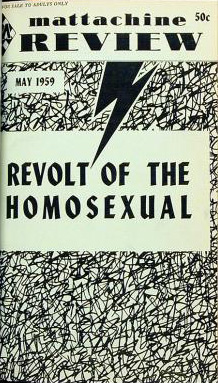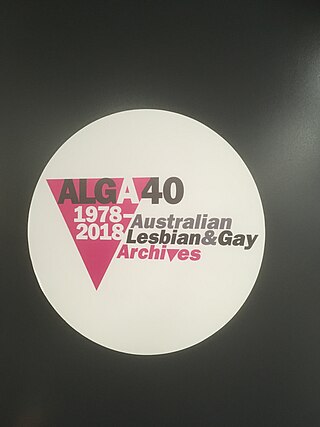The Australian arm of the Daughters of Bilitis was formed in Melbourne in 1969, and is considered Australia's first gay rights group. It was inspired by the American Daughters of Bilitis movement. After a few months, the group rejected the increasing radicalisation of its American counterpart, and renamed itself the Australasian Lesbian Movement.

The Mattachine Society, founded in 1950, was an early national gay rights organization in the United States, preceded by several covert and open organizations, such as Chicago's Society for Human Rights. Communist and labor activist Harry Hay formed the group with a collection of male friends in Los Angeles to protect and improve the rights of gay men. Branches formed in other cities, and by 1961 the Society had splintered into regional groups.

Dorothy Louise Taliaferro "Del" Martin and Phyllis Ann Lyon were an American lesbian couple based in San Francisco who were known as feminist and gay-rights activists.

The Daughters of Bilitis, also called the DOB or the Daughters, was the first lesbian civil and political rights organization in the United States. The organization, formed in San Francisco in 1955, was initially conceived as a secret social club, an alternative to lesbian bars, which were subject to raids and police harassment.

The homophile movement is a collective term for the main organisations and publications supporting and representing sexual minorities in the 1950s to 1960s around the world. The name comes from the term homophile, which was commonly used by these organisations. At least some of these organisations are considered to have been more cautious than both earlier and later LGBT organisations; in the U.S., the nationwide coalition of homophile groups disbanded after older members clashed with younger members who had become more radical after the Stonewall riots of 1969.

Founded in 1952, One Institute, is the oldest active LGBTQ+ organization in the United States, dedicated to telling LGBTQ+ history and stories through education, arts, and social justice programs. Since its inception, the organization has been headquartered in Los Angeles, California.
Lavender Menace was an informal group of lesbian radical feminists formed to protest the exclusion of lesbians and their issues from the feminist movement at the Second Congress to Unite Women in New York City on May 1, 1970. Members included Karla Jay, Martha Shelley, Rita Mae Brown, Lois Hart, Barbara Love, Ellen Shumsky, Artemis March, Cynthia Funk, Linda Rhodes, Arlene Kushner, Ellen Broidy, and Michela Griffo, and were mostly members of the Gay Liberation Front (GLF) and the National Organization for Women (NOW). They later became the Radicalesbians.
Society Five was a gay rights and social support organisation formed in Melbourne, Australia, in January 1971. Initially known as Campaign Against Moral Persecution, after the Sydney-based organisation that inspired it, the group was soon renamed Society Five. For a decade it campaigned on behalf of Melbourne's gay community, as well as offering a telephone counselling service. By 1977 it was matched in strength by the Homosexual Law Reform Coalition. By 1981 it had disbanded, following internal conflicts.

LGBT movements in the United States comprise an interwoven history of lesbian, gay, bisexual, transgender and allied social movements in the United States of America, beginning in the early 20th century. A commonly stated goal among these movements is social equality for LGBT people. Some have also focused on building LGBT communities or worked towards liberation for the broader society from biphobia, homophobia, and transphobia. LGBT movements organized today are made up of a wide range of political activism and cultural activity, including lobbying, street marches, social groups, media, art, and research. Sociologist Mary Bernstein writes: "For the lesbian and gay movement, then, cultural goals include challenging dominant constructions of masculinity and femininity, homophobia, and the primacy of the gendered heterosexual nuclear family (heteronormativity). Political goals include changing laws and policies in order to gain new rights, benefits, and protections from harm." Bernstein emphasizes that activists seek both types of goals in both the civil and political spheres.
This is a list of notable events in the history of LGBT rights that took place in the 1970s.
The North American Conference of Homophile Organizations was an umbrella organization for a number of homophile organizations. Founded in 1966, the goal of NACHO was to expand coordination among homophile organizations throughout the Americas. Homophile activists were motivated in part by an increase in mainstream media attention to gay issues. Some feared that without a centralized organization, the movement would be hijacked, in the words of founding member Foster Gunnison Jr., by "fringe elements, beatniks, and other professional non-conformists".

The Australian Queer Archives (AQuA) is a community-based non-profit organisation committed to the collection, preservation and celebration of material reflecting the lives and experiences of lesbian, gay, bisexual, transgender and intersex LGBTI Australians. It is located in Melbourne. The Archives was established as an initiative of the 4th National Homosexual Conference, Sydney, August 1978, drawing on the previous work of founding President Graham Carbery. Since its establishment the collection has grown to over 200,000 items, constituting the largest and most significant collection of material relating to LGBT Australians and the largest collection of LGBT material in Australia, and the most prominent research centre for gay, lesbian, bisexual, trans and intersex history in Australia.
The Council on Religion and the Homosexual (CRH) was a San Francisco, California, United States-based organization founded in 1964 for the purpose of joining homosexual activists and religious leaders.

In the United States, lesbian, gay, bisexual, and transgender (LGBTQ) people have a long history, including vibrant subcultures and advocacy battles for social and religious acceptance and legal rights.
Focus: A Journal for Lesbians was an American lesbian magazine that was published from 1970 to 1983.
Beth Elliott is an American trans lesbian folk singer, activist, and writer. In the early 1970s, Elliot was involved with the Daughters of Bilitis and the West Coast Lesbian Conference in California. She became the centre of a controversy when a minority of attendees in the 1973 Conference, including a keynote speaker, called for her removal because of her trans status.

The following is a timeline of lesbian, gay, bisexual, and transgender (LGBT) history in the 20th century.
Equal is an American documentary television series produced by Scout Productions, Berlanti Productions, Raintree Ventures, That's Wonderful Productions, and Warner Horizon Unscripted Television. The four-part series chronicles landmark events and leaders in LGBTQ history, and consists of a mixture of archival footage and scripted reenactments. Equal stars several actors including Samira Wiley, Jamie Clayton, and Anthony Rapp. The series premiered on HBO Max on October 22, 2020.
Marcia M. Gallo is an American historian and author. She is professor emerita at the University of Nevada, Las Vegas. Her 2016 non-fiction book, No One Helped, won the Judy Grahn Award for Lesbian Nonfiction and Lambda Literary Award for LGBT Nonfiction.